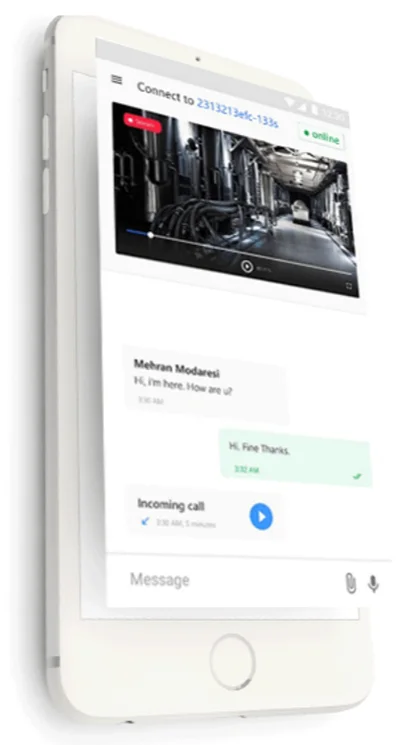If one wants to find something good about the past years of the Corona pandemic, it is of course the big step in the field of digitalisation that was triggered by it. Entrenched structures and blockade attitudes against innovations and new developments were broken up by the pandemic and its side effects such as lockdown and helped the topic of "remote" in particular to achieve a breakthrough on a broad front. Telework is now generally accepted, even actively sought and encouraged. In other areas, too, such as fitness and learning, it has become completely normal to be able to take advantage of a wide range of personal or even remote offers.
Remote auditing and related applications were also able to benefit from the limitations of the pandemic and establish themselves in many areas of industry and commerce. Only the pandemic and its side effects made it possible in many places to finally tackle the sometimes high initial investments in order to benefit from the advantages of this technology in the long term.
Definition Remote Audit

Remote audits are generally defined as forms of auditing that make the personal presence of the auditor on site unnecessary by using technical aids. In the simplest case, these tools are laptops, tablets or smartphones, in the more advanced case also data glasses and smart glasses. The remote audit therefore basically consists of technical aids to support audiovisual communication. However, remote audit only becomes truly effective and profitable with the introduction of specialised functions and software. For example, automated functions can be realised by means of data glasses, which relieve the auditor and the helpers on site. Automated commissioning via built-in scanners is such a current topic, but also automated documentation via photo or video material can significantly accelerate and qualitatively improve necessary audit rework in particular.
Remote audit is therefore more than just the addition of audio and video in the context of QM and audit measures. In addition to its original definition, remote audit should represent an overarching process that introduces software-driven improvements in a targeted manner and can also promote continuous digitalisation in general. The more digital all processes are, the more profound and better the remote audit processes can be. Future developments will be particularly interesting here. By linking them with artificial intelligence, fully automated follow-up processes can be established, for example in automated ordering or error control.
Advantages and disadvantages of remote audit in quality management

The focus of remote audits is, of course, on reducing costs in terms of personnel, time and organisation. Expensive and time-consuming travel can be reduced. The associated ancillary costs (meals, accommodation) are completely eliminated. Once established, the preparatory work is also much less time-consuming. Remote audits can therefore be planned at shorter notice or even carried out spontaneously (topic compliance and supply chain law). Once established, the costs also remain manageable. The necessary technology such as tablets or laptop computers is available almost everywhere and can be quickly exchanged and replaced if necessary.
Remote audits can also be used to react more quickly to problems that are found and to increase productivity in general. In particular, the performance of post-audits is greatly simplified and audit follow-up (documentation) can be almost completely automated.
The disadvantages of remote auditing are, of course, the initial acquisition costs. While rudimentary hardware such as tablets and laptops are available everywhere, data glasses for the implementation of higher-quality services are not yet widespread and are also quite expensive. In particular, remote audit requires specialised or customised software to be as effective as possible. On the one hand, this software is quite expensive or has to be created individually, which is even more expensive. The still not really good network coverage in Germany is another problem. Especially in rural areas, there are still often problems here and ultimately all remote audit services are dependent on a good and stable network infrastructure. Last but not least, socio-psychological aspects must also be considered. New technology can always lead to acceptance problems and this must be countered with foresight.
Remote Audit Software
Of paramount importance for the success of remote audit is the use of modern and flexible remote audit software that bundles all information and processes. In the best case, remote audit software is an integrated but open platform for remote functions itself, but also for further functions such as process and document management. Unfortunately, remote audit software is still very expensive today because the market is very small and there are only a few market participants. The often still existing customisation effort also pushes up the initial costs. However, remote audit software is an investment in a quality-oriented future and pays for itself more quickly through the number of tasks assigned to it.
PeRoBa Quality Management from Munich - iVision® Software for Remote Audit
CONSULTING, IMPLEMENTATION, AUDITS AND QM TOOLS FROM A SINGLE SOURCE
PeRoBa GmbH Munich is a service provider with many years of experience in quality management,
especially in automotive and mechanical engineering. We help with all important standards (VDA6.3, IATF 16949,...)
on the way to certification or re-certification. We also work closely with universities and research institutions.
Managing Director Dr. Scherb teaches as a lecturer, for example, at the Hamburger Fern-Hochschule, the FOM in Munich
and is also a speaker at the TÜV-Süd Akademie, the Bildungswerk der Bayerischen Wirtschaft and many other institutions.
We look forward to hearing from you. The best way to reach us is by phone at the number
+49 8106 / 230 89 92
(more
Contact options)
Quality management - ISO 9001, VDA 6.3
and IATF 16949 Consulting and Audits - www.peroba.org